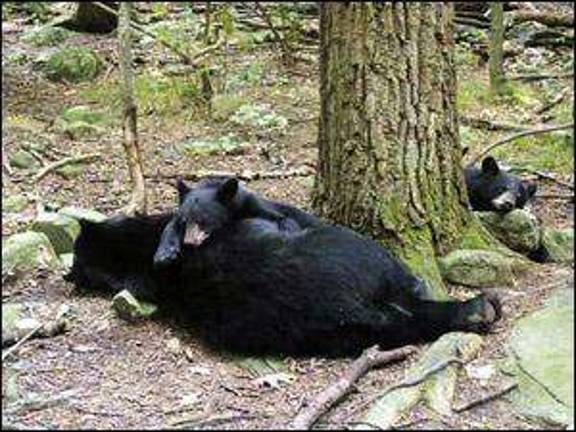Both sides taking aim at state bear hunt

Sussex County - New Jersey hunters may be loaded for bear, but animal rights activists believe they have the right ammunition to stop the state’s second hunt in 35 years. Attorneys representing anti-hunt groups in and around the state are investigating filing a lawsuit to prevent the planned hunt, which New Jersey officials announced last week under a comprehensive five-year bear management policy. Bradley Campbell, commissioner of the Department of Environmental Protection Agency, said the state would hold a six-day hunt across a 1,600-square-mile section of northern New Jersey, Dec. 5-10, to manage the increasing bear population. There are an estimated 3,200 bears in the Northwest quadrant of New Jersey. Each of the state’s 21 counties has reported sightings, but the majority of bears are concentrated in the northwest, from parts north of Route 78 and west of Route 287. Most of the bears in Sparta are believed to be within the 1,394-acre Sparta Mountain Wildlife Management Area, off Route 517 and Glen Road along the Highlands Trail. The area is divided into two sections, one managed by the Division of Fish, Game and Wildlife as a hunting preserve; and the other by the Audubon Society to conserve and restore natural ecosystems. “As the black bear population has expanded, incidents involving risks to public safety and property, which subsided after the 2003 hunt, have increased significantly,” said Campbell, in a letter to the state Fish and Game Council announcing his approval of the bear management policy. “Moreover, excess population in areas of suitable black bear habitat has led to increasing black bear migration to areas of the state where little suitable habitat exists and where risks to populous communities are consequently greater.” A rising number of complaints have been made about the animals breaking into suburban homes and raiding trashcans, while foraging for food. One report had a bear startling a sleeping camper at a Sussex County state park this past summer. The commissioner opposed a bear hunt last year after allowing one in 2003, the state’s first in 33 years. The state Supreme Court had halted a proposed hunt scheduled for December last year, but instead ordered the five-year black bear management policy, which Campbell approved last week. Besides the hunts, the policy includes provisions for improved trash control, public education about bears and expanded scientific research on bruins. Some 4,000 hunters have applied for permits. Meanwhile, environmental and animal rights activists criticized the bear management policy and hunt authorization. On Saturday, nearly 100 demonstrators lined Route 23 near West Milford to protest the scheduled hunt. The Humane Society of the United States said the new policy fails to present any scientific data that a bear hunt will target the population of bears responsible for public conflicts. Animal rights groups have said if residents limited access to their garbage, the nuisances and complaints created by bears would be reduced. Anti-hunt proponents also have said the new policy does not require mandatory use of bear-proof trash cans or a ban on putting out garbage at night in areas of high bear activity. In October, volunteers from an anti-hunt group attempted to persuade the township council to adopt the use of bear-resistant trash containers in Sparta as a deterrent to the animals. Sparta is considering awarding a municipal contract for collecting garbage township-wide. The management policy recommends that this year’s shotgun hunt be expanded to nine days in 2006 and 2007, with one day of archery hunting on the Saturday after Thanksgiving and two days of muzzleloader hunting on the Monday and Tuesday after Thanksgiving. A bear birth control project now under way with a captive bruin population at the Great Adventure Park in Jackson was also given a five-year extension. Within three years, a decision would be made on whether to seek federal Food and Drug Administration approval for field-testing of contraceptives on bears in the wild. Public education efforts aimed at minimizing interactions with black bears and campers and homeowners living near bear habitats also are outlined in the policy.